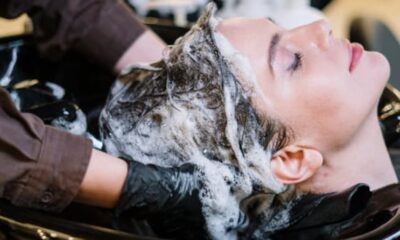Expert Advice
Can We Wash Hair on Ekadashi?
Ekadashi, a significant day of fasting and spiritual reflection in Hinduism, has evolved over time to accommodate modern lifestyles and personal needs.
As religious practices have transformed, there has been a growing exploration of incorporating personal hygiene practices within the observance of Ekadashi.
In this article, we will delve into modern interpretations and adaptations of Ekadashi, nurturing a spiritual connection while considering personal needs, and provide practical tips for observing this sacred day.
Can We Wash Hair on Ekadashi?

Ekadashi, a significant observance in Hinduism, holds a special place in the hearts of millions of devotees. It’s belief that in Hindu tradition Women should not wash their hair and Men should avoid shaving on this day.
It is a sacred day of fasting and spiritual reflection, observed on the eleventh day of the lunar cycle.
While Ekadashi is known for its traditional restrictions, one question often arises: Can we wash our hair on Ekadashi?
In this article, we will delve into the beliefs and practices surrounding this topic to gain a better understanding.
Ekadashi Observance:
Fasting on Ekadashi is a common practice, with devotees abstaining from food and water for the entire day.
Additionally, there are traditional restrictions that vary among different communities and households.
These restrictions aim to create an atmosphere of heightened spirituality and purity during this sacred day.
The Importance of Hair Washing:
Hair washing is an integral part of personal hygiene and cleanliness for many individuals. It plays a significant role in maintaining scalp health and overall well-being.
Moreover, cultural and personal preferences often influence the frequency and manner of hair washing. However, the religious and spiritual significance of hair washing on Ekadashi remains a subject of debate.
Hair Washing on Ekadashi:
Opinions and beliefs regarding hair washing on Ekadashi differ among individuals.
Those against hair washing argue that it is best to abstain from activities that may distract from the spiritual focus of the day.
Following traditional practices and customs, they believe that refraining from hair washing helps maintain the sanctity of the observance.
On the other hand, proponents of hair washing on Ekadashi emphasize personal hygiene and cleanliness as crucial factors.
They argue that hair washing contributes to overall well-being and should not be restricted on this auspicious day.
Some propose modern interpretations and adaptations of traditional practices that allow for personal choices and individual needs.
Perspectives from Hindu Scriptures and Traditions:
Hindu scriptures and traditions provide varying references to the act of hair washing on Ekadashi.
Interpretations by different sects and scholars further contribute to the diversity of beliefs.
Cultural variations and regional practices also shape the perspectives held by devotees.
The Role of Intent and Devotion:
The essence of Ekadashi lies in the intentions and devotion of the individual.
It is crucial to focus on spiritual intentions and mindfulness while observing this sacred day.
Personal beliefs and convictions play a significant role in shaping one’s approach to hair washing on Ekadashi.
Balancing religious observance with individual needs and understanding is key to maintaining harmony.
Alternative Practices:
For those who wish to wash their hair on Ekadashi but respect traditional practices, modifications and compensatory acts can be considered.
Rituals or offerings to deities, seeking guidance from religious leaders or gurus, or performing acts of charity are ways to navigate this dilemma while honoring the sanctity of the day.
Exploring Modern Interpretations and Adaptations:
- A. Evolution of religious practices over time:
Over the years, religious practices have undergone transformations to adapt to the changing world.
The focus has shifted from strict adherence to external rituals to a deeper understanding of the underlying spiritual essence.
This evolution has paved the way for modern interpretations of Ekadashi, allowing for flexibility and personal choices while upholding the sanctity of the observance.
- B. Incorporating personal hygiene practices within Ekadashi observance:
Recognizing the importance of personal hygiene, individuals have sought ways to harmonize their hygiene routines with the observance of Ekadashi.
It is believed that maintaining the cleanliness and purity of the body can be achieved without compromising the spiritual significance of the day.
This includes practices such as gentle hair washing, using herbal or natural products, and avoiding excessive use of styling products.
- C. Nurturing spiritual connection alongside personal needs:
The essence of Ekadashi lies in the intention and devotion of the individual.
It is crucial to strike a balance between religious observance and personal needs.
Nurturing a spiritual connection can be achieved through mindful practices such as meditation, reading sacred texts, engaging in self-reflection, and expressing gratitude.
Integrating these practices with personal hygiene routines can enhance the overall spiritual experience of Ekadashi.
Practical Tips for Observing Ekadashi:
- A. Understanding personal beliefs and preferences:
Each individual holds unique beliefs and preferences regarding Ekadashi observance.
It is important to introspect and understand one’s own spiritual journey and the significance Ekadashi holds in their life.
This self-reflection will help in making informed choices and creating a meaningful observance tailored to personal beliefs.
- B. Respecting traditional customs while honoring personal hygiene:
While incorporating personal hygiene practices, it is crucial to respect and acknowledge the traditional customs associated with Ekadashi.
Balancing personal needs with religious traditions can be achieved by finding a middle ground.
For example, one can opt for gentle hair washing while avoiding elaborate styling or excessive use of products, staying mindful of the sanctity of the day.
- C. Seeking guidance from religious authorities:
When in doubt or seeking clarification, it is advisable to consult religious authorities or spiritual guides who can provide guidance based on scriptural teachings and traditions.
They can offer insights into the best practices for observing Ekadashi while considering personal hygiene practices.
As the world evolves, so do religious practices. Ekadashi, a sacred day in Hinduism, has seen modern interpretations and adaptations that accommodate personal hygiene practices without compromising its spiritual essence.
By understanding personal beliefs, respecting traditional customs, and seeking guidance when needed, individuals can observe Ekadashi in a way that nurtures their spiritual connection while honoring their personal needs.
As we navigate the complexities of modern life, these practical tips enable us to engage in this auspicious observance with mindfulness and devotion.
Disclaimer:
This article has been written by us by using Google search for research. We are not against the beliefs and rules of any religion. We do not want to hurt any feelings of any religion.
Also Read: Wash and Wear Haircuts for Over 60
Conclusion:
In conclusion, the question of whether we can wash our hair on Ekadashi is subjective and open to individual interpretation.
As we have explored, there are varying perspectives rooted in cultural, religious, and personal beliefs.
It is important to respect the diversity of these interpretations and to make choices based on personal convictions while maintaining a deep sense of devotion and mindfulness.
Whether one chooses to refrain from hair washing or allows for personal hygiene practices, the underlying essence of Ekadashi lies in the purity of heart and spiritual connection that is nurtured on this sacred day.
Disclaimer: Above article information based on google search. We do not want to hurt any feeling of any religion.
-

 Expert Advice2 years ago
Expert Advice2 years agoCan Albinos Dye Their Hair – Let’s Find Out
-

 Expert Advice2 years ago
Expert Advice2 years agoHow to Tone Down Hair Color That is Too Bright? – 8 Super Simple Ways
-

 Expert Advice2 years ago
Expert Advice2 years agoT Bar Highlights
-

 How To2 years ago
How To2 years agoChocolate Cherry Hair Color – How to Get Exact Shade?
-

 Expert Advice2 years ago
Expert Advice2 years agoWhy Do Salons Wash Your Hair After Coloring?
-

 Expert Advice2 years ago
Expert Advice2 years agoCan You Dye Synthetic Hair With Semi Permanent? Let’s Find Out
-

 Hair Styles12 months ago
Hair Styles12 months agoWash and Wear Haircuts for Over 60
-

 Expert Advice2 years ago
Expert Advice2 years agoHalf Green Half Black Hair – Methods to Get This Look

Pingback: Can I Wash Hair on Amavasya?